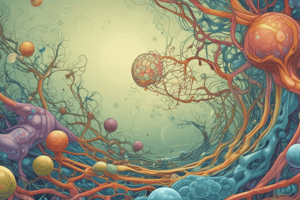Podcast
Questions and Answers
¿Cuál es la función principal de la membrana plasmática?
¿Cuál es la función principal de la membrana plasmática?
- Producir energía para la célula
- Sintetizar proteínas
- Separar la célula de su entorno (correct)
- Regular el crecimiento y desarrollo de la célula
¿Qué es el citoplasma?
¿Qué es el citoplasma?
- Una organela que produce energía
- Un líquido gelatinoso dentro de la célula (correct)
- Un tipo de lisosoma
- Una parte del núcleo que contiene el ADN
¿Cuál es la función principal de los lisosomas?
¿Cuál es la función principal de los lisosomas?
- Regular el crecimiento y desarrollo de la célula
- Sintetizar proteínas
- Digerir y reciclar desechos celulares (correct)
- Producir energía para la célula
¿Cuál es la función principal de la replicación celular?
¿Cuál es la función principal de la replicación celular?
¿Qué tipo de células carecen de núcleo?
¿Qué tipo de células carecen de núcleo?
¿Cuál es la función principal de los mitocondrias?
¿Cuál es la función principal de los mitocondrias?
¿Qué es el aparato de Golgi?
¿Qué es el aparato de Golgi?
¿Cuál es la función principal del núcleo?
¿Cuál es la función principal del núcleo?
¿Qué función realizan las células cuando responden a estímulos?
¿Qué función realizan las células cuando responden a estímulos?
¿Cuál es la función principal de los ribosomas?
¿Cuál es la función principal de los ribosomas?
Flashcards are hidden until you start studying
Study Notes
Cell Structure
- Plasma membrane: semi-permeable membrane that separates the cell from its environment
- Cytoplasm: jelly-like substance inside the cell membrane, where metabolic processes take place
- Nucleus: control center of the cell, contains genetic material (DNA)
- Mitochondria: energy-producing organelles, responsible for cellular respiration
- Endoplasmic reticulum: network of membranous tubules and cisternae, involved in protein synthesis and transport
- Ribosomes: small organelles, site of protein synthesis
- Lysosomes: membrane-bound sacs, contain digestive enzymes for breaking down and recycling cellular waste
- Golgi apparatus: complex of flattened sacs, involved in protein modification and secretion
Cell Functions
- Metabolism: conversion of energy and nutrients into usable forms
- Growth and development: increase in cell size and number, differentiation into specialized cells
- Response to stimuli: ability to react to changes in environment, e.g. light, temperature, touch
- Reproduction: creation of new cells through cell division (mitosis or meiosis)
- Cell signaling: communication between cells, through chemical signals (hormones, neurotransmitters)
Cell Types
- Prokaryotic cells: lack nucleus, typically small and simple, e.g. bacteria
- Eukaryotic cells: have nucleus, typically larger and more complex, e.g. plants, animals, fungi
- Stem cells: undifferentiated cells, capable of differentiating into various cell types
Cell Division
- Mitosis: division of somatic cells, results in two identical daughter cells
- Meiosis: division of reproductive cells, results in four non-identical daughter cells with half the number of chromosomes as the parent cell
Studying That Suits You
Use AI to generate personalized quizzes and flashcards to suit your learning preferences.




